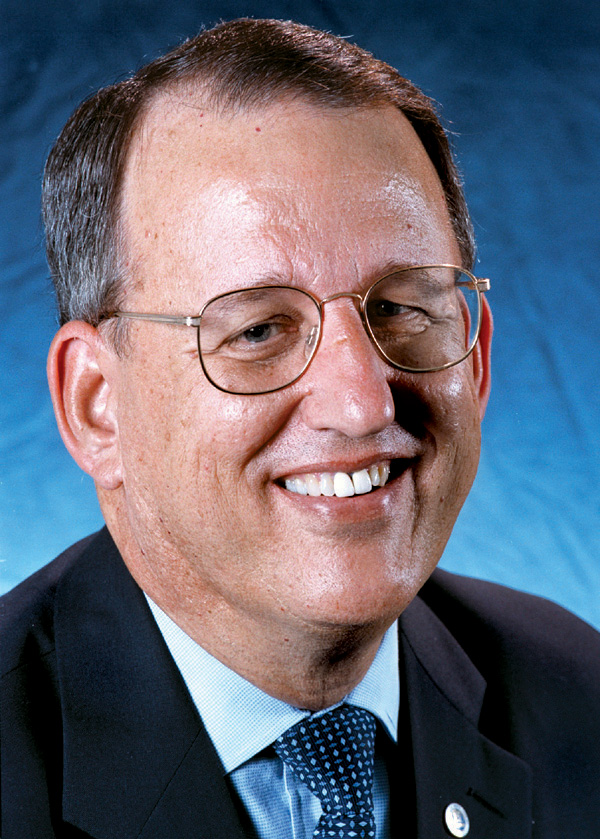In Transition
Posted on Sept. 8, 2015Thirty years ago, in January 1985, a search committee began working to identify a successor to William C. Friday ’48 (LLB), who served as UNC System president for 30 years.

GAA President Doug Dibbert ’70
Since March 1986, when Friday retired, there have been four UNC System presidents, and a search is underway this fall to select Tom Ross’ successor with the intention that a new president will assume office in January. The five UNC System leaders reaching back nearly 60 years have been:
- 1956-86 — William C. Friday ’48 (LLB)
- 1986-97 — C. Dixon Spangler ’54
- 1997-2005 — Molly Corbett Broad
- 2006-10 — Erskine B. Bowles ’67
- 2011-15 — Thomas W. Ross Sr. ’75 (JD)
Until the UNC System for Higher Education was formed by the N.C. General Assembly in 1972, the statewide university system’s governing board of trustees consisted of 100 individuals, and that board was chaired by the governor of North Carolina. Subsequently, each of the 16 universities has had its own 13-member board of trustees, one-third of whom are appointed by the governor with the other two-thirds being elected by the UNC System’s Board of Governors. Today, the system’s 32-member Board of Governors is elected by the N.C. General Assembly — half by the state Senate and half by the House. Ten members of the current Board of Governors began their present service in July.
President Ross has selected new chancellors for 11 universities — all except those at N.C. State, N.C. A&T, Fayetteville State, UNC-Charlotte, East Carolina and the N.C. School of Science and Mathematics.
On our campus, UNC’s 11th chancellor, Carol L. Folt, has begun her third year working with a Board of Trustees with only two members who were serving when she was selected by President Ross. Of the 18 members of the Chancellor’s Cabinet who convened under Holden Thorp ’86 in July 2008, only three remained when Chancellor Folt became chancellor in July 2013.
Since joining Chancellor Folt in July 2013 as provost and executive vice chancellor, James Dean has selected new deans for Kenan-Flagler Business School and UNC’s School of Law. He currently is directing searches for new deans for the College of Arts and Sciences and the schools of education, social work and nursing.
And in the N.C. General Assembly, 18 out of 50 senators — 36 percent — are in their first or second term. Fifty-four of 120 representatives — 45 percent — are in their first or second term, meaning that 72 of 170 legislators, or 42.4 percent, have less than three years of service in the General Assembly.
Uncertain future administrative leadership of the UNC System, along with scant institutional memory among its volunteer board and with relative inexperience among so many in the General Assembly, leaves our campus unusually vulnerable.
North Carolina’s historic commitment to public higher education remains unique when contrasted to other states, but we cannot assume that all new members of the General Assembly and the Board of Governors know about, embrace and will reaffirm this support. As state legislative candidates are recruited and the 2016 elections approach, it is critical that Carolina’s 308,000-plus alumni — particularly the 167,500 residing and voting in North Carolina — express our expectation to those seeking election or re-election to the General Assembly and to members of the UNC System Board of Governors that they continue to provide needed support to public higher education.
With the decline of the tobacco, textile and furniture industries, higher education has become an even more vital contributor to North Carolina’s economy. Combined, our University and the UNC Health Care System have an annual economic impact of $7 billion in North Carolina, supporting 100,000 jobs. Beyond creating jobs and preparing dentists, doctors, pharmacists, journalists, librarians, teachers, lawyers, nurses and local and state governmental leaders, our nearly $1 billion research efforts are addressing some of the world’s most challenging problems — cancer, HIV/AIDS and clean water, to name only three. And our mission continues: Prepare graduates who will be engaged citizens and whose quality of life is enhanced by appreciating the arts, embracing diversity, understanding that ours is now a global economy, and so much more.
Throughout this period of transition, we can continue to be comforted knowing that there is no place North Carolina taxpayers can invest a dollar and get a better return than at our University.
Yours at Carolina,

Douglas S. Dibbert ’70
